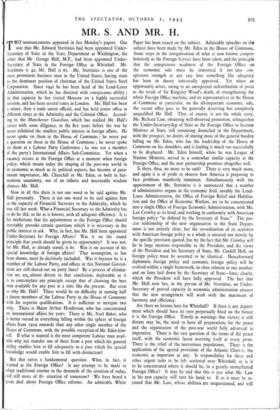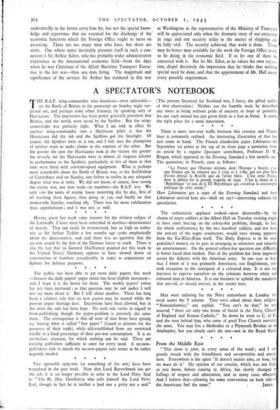MR. S. AND MR. H.
TWO announcements appeared in last Monday's papers. One was that Mr. Edward Stettinius had been appointed Under- Secretary of State in the State Department at Washington, the other that Mr George Hall, M.P., had been appointed Under- Secretary of State in the Foreign Office in Whitehall. Mr. Stettinius is 42, Mr. Hall is 61. Mr. Stettinius is one of the most prominent business men in the United States, having risen to the dominant position of chairman of the United States Steel Corporation. Since 1941 he has been head of the Lend-Lease Administration, which he has directed with conspicuous ability ; in that capacity he has visited Moscow on a highly successful mission, and has been several times in London. Mr. Hall has been a miner, then a trade union official, and has held junior office at different. times at the Admiralty and the Colonial Office. Accord- ing to the Manchester Guardian, which has studied Mr. Hall's career with some diligence, in the five years before the war he never exhibited the smallest public interest in foreign affairs. He never spoke on them in the House of Commons ; he never put a question on them in the House of Commons ; he never spoke on them at a Labour Party Conference ; he was not a member of the party's International Affairs Sub-Committee. Yet when a vacancy occurs at the Foreign Office at a moment when foreign policy, which means today the shaping of the post-war world in its economic as much as its political aspects, has become of para- mount importance, Mr. Churchill or Mr. Eden, or both in har- monious unanimity, out of an infinite and inscrutable wisdom chooses Mr. Hall.
Now in all this there is not one word to be said against Mr. Hall personally. There is not one word to be said against him in the capacity of Financial Secretary to the Admiralty, which he was till last week. What a Financial Secretary to the Admiralty has to do he did, so far as is known, with all adequate efficiency. It is his misfortune that his appointment to the Foreign Office should inevitably provoke certain questions which it is necessary in the public interest to ask. Why, in fact, has Mr. Hall been appointed Under-Secretary for Foreign Affairs? Was it on the sound principle that youth should be given its opportunity? It was not, for Mr. Hall, as already stated, is 61. Was it on account of his special knowledge of foreign affairs? That assumption, as has been shown, must be decisively excluded. Was it because he is a member of the Labour Party, and offices in this National Govern- ment are still shared out on party lines? By a process of elimina- tion we are almost driven to that conclusion, deplorable as it is to contemplate any principle except that of choosing the best man available for any post at a time like the present. But even so why Mr. Hall? There would be no difficulty in naming half a dozen members of the Labour Party in the House of Commons with far superior qualifications. It is sufficient to mention two only. There, is Major Arthur Henderson, who has concentrated on international affairs for years. There is Mr. Noel Baker, who is better versed in everything falling within the sphere of foreign affairs from 1919 onwards than any other single member of the House of Commons, with the possible exception of Mr. Eden him- self. If what is wanted is the most competent Labour man avail- able why not transfer one of these from a post which his general ability enables him to fill adequately to a post which his special knowledge would .enable him to fill with distinction?
But that raises a fundamental question. What, in fact, is wanted at the Foreign Office? Is any attempt to be made to adapt traditional routine to the demands of the situation of today, and still more of the situation of tomorrow? We have heard a great deal about Foreign Office reforms. An admirable White Paper has been issued on the subject. Admirable speeches on the subject have been made by Mr. Eden in the House of Commons. Some steps in the reorganisation of what is now known compre- hensively as the Foreign Service have been taken, and the principle that the conspicuous weakness of the Foreign Office on the economic side must be converted if not into con- spicuous strength at any rate into something like adequacy has been in theory universally approved. Yet when an opportunity arises, owing to an unexpected redistribution of posts as the result of Sir Kingsley Wood's death, of strengthening the whole Foreign Office machine, and its representatives in the House of Commons in particular, on the all-important economic side, the vacant office goes to the generally deserving but completely unqualified Mr. Hall. That, of course, is not the whole story. Mr. Richard Law, obtaining well-deserved promotion, relinquishes the Under-Secretaryship of State at the -Foreign Office to become Minister of State, still remaining domiciled in the Department, with the prospect, no doubt, of sharing more of the general burden falling on Mr. Eden, who has the leadership of the House of Commons on his shoulders, and is leading it much too successfully to be displaced. Mr. Eden himself, when he was League of Nations Minister, served in a somewhat similar capacity at the Foreign Office, and the new partnership promises altogether well. I's there, then, no more to be said? There is very much more, and again it is of profit to observe how America is preparing to face problems manifestly imminent. Simultaneously with the appointment of Mr. Stettinius it is announced that a numbet of administrative organs in the economic field, notably the Lend- Lease Administration, the Office of Foreign Relief and Habilita- tion and the Office of Economic Warfare, are to be concentrated into a single Office of Foreign Economic Administration, with Mr. Leo Crowley as its head, and working in conformity with American foreign policy "as defined by the Secretary of State." The pre- cise relationship of the new organisation to the State Depart- ment is not entirely clear, but the co-ordination of its activities with American foreign policy as a whole is ensured not merely by the specific provision quoted, but by the fact that Mr. Crowley will be in large measure responsible to the President, and the views of the President and his Secretary of State, Mr. Cordell Hull, on foreign policy must be assumed to be identical. Henceforward diplomatic foreign policy and economic foreign policy will be evolved within a single framework, in close relation to one another, and on lines laid down by the Secretary of State—lines, clearly, which the President will have fully approved. The fact that Mr. Hull now has, in the person of Mr. Stettinius, an Under. Secretary of proved capacity in economic administration ensures that the new arrangement will work with the maximum of harmony and efficiency.
Are there no lessons here for Whitehall? If there is any depart- ment which should have its eyes perpetually fixed on the future it is the Foreign Office. Timely as warnings that victory is still distant may be; the need to have all preparations for the peace and the organisation of the post-war world fully advarced is imperative. There is the vast question of the terms of the peace itself, with the economic factor asserting itself at every point. There is the relief of the necessitous populations. There is the application of the agreed provisions of the Atlantic Chart-n-, the economic as important as any. Is responsibility for these and other urgent tasks to be left scattered over Whitehall, or is it to be concentrated where it should be, in a greatly strengthened Foreign Office? It may be said that this is just what Mr. Law in his new capacity will turn his hand to. If so it must be re- joined that Mr. Law, whose abilities are unquestioned, and will undoubtedly in the future carry him far, has not the special know- ledge and experience that are essential for the discharge of the economic functions which the Foreign Office ought to insist on assuming. There are not many men who have, but there are some. One whose name inevitably presents itself in such a con- nexion is Sir Arthur Salter, who has probably wider administrative experience in the international economic field—from the days when he was Chairman of the Allied Maritime Transport Execu- tive in the last war—than any man living. The magnitude and significance of the services Sir Arthur has rendered in this war at Washington as the representative of the Ministry of Transport will be appreciated only when the dramatic story of our extremity in 1941 and our security today in the matter of shipping can be fully told. The security achieved, that work is done. There may be better men available for the work the Foreign Office needs to be doing in the economic field.. If so let one of them be entrusted with it. But let Mr. Eden, as he values his own reputa- tion, dispel decisively the impression that he thinks that nothing special need be done, and that the appointment of Mr. Hall meets every possible requirement.



























 Previous page
Previous page